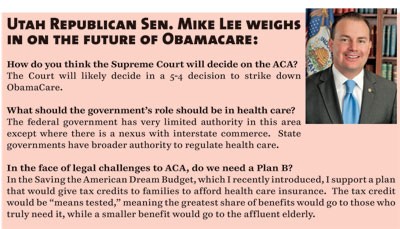
This year on Valentine’s Day, I joined 49 other physicians from across America in signing an Amicus brief asking the U.S. Supreme Court to overturn the Affordable Care Act (Obamacare). Among these 50 physicians, I was the only one with a conservative political leaning. Despite the others’ more liberal/progressive leaning, they agreed with me that the individual mandate is unconstitutional. More importantly, we agree that Obamacare does not address the central problem with the American health-care system, which is its extraordinary cost. We also agree that the only way to really reform our sick health-care system is to radically change the way we Americans do health-care business.
Despite my more conservative politics, I join the other physicians in proposing single-payer health-system reform.
The Affordable Care Act fails to address the cost of American health-care delivery because the central feature of Obamacare is the forced reliance on the private health-insurance-industry business model, known as the individual mandate. Private health insurance is the most wasteful way to pay for health care ever invented, with excess administrative costs in the United States of about $400 billion per year. In addition, the private health-insurance business model distorts incentives in health-care delivery. This induces mediocre care—it pays for inappropriate care and ignores patient safety, while failing to consistently use clinically proven interventions. These poor-quality problems in the United States health-care system cost an additional $700 billion per year in wasted payments.
I have been the leading voice for single-payer health-system reform in Utah for 15 years. Since 2009, I have chaired the Utah Healthcare Initiative (UHI), a registered political-issue committee created with the sole purpose of bringing comprehensive, sustainable health-system reform to the ballot in Utah. Once Obamacare fails—either through action by the Supreme Court, or later, when its exorbitant costs can no longer be borne by the taxpayer—Americans will once again be faced with the need to reform our failed health system. This next time, we must do the job right.
We, at UHI, propose radical reforms uniquely suited to Utah, which take advantage of the best aspects of health-care delivery already present in the Beehive State. We have the nation’s lowest per-capita health-care cost, in part because we have some of the nation’s highest-quality hospitals and associated clinics (IHC and University Hospital). We also have one of the nation’s most efficient private payers for health-care services—the Public Employees Health Plan (PEHP).
PEHP has an overhead cost consistently less than 4 percent, substantially below the Utah industry average of 15 percent. PEHP is a private, nonprofit trust fund operated for Utah public employees and their dependents. UHI proposes to convert PEHP to the sole payer for health-care services for all Utahns and rename it the Utah Health Cooperative. Immediately upon passage of the ballot initiative enabling this transformation, the Utah Health Cooperative would begin offering a health-benefit program to all residents of Utah while beginning the process of merging with all public health-care programs (Medicaid, CHIP, etc.) Private health insurers would have two years to phase out their Utah operations.

The Utah Health Cooperative would negotiate to become the fiscal agent for Medicare in Utah, anticipating the time when Medicare beneficiaries living in the Beehive State could be phased into full participation in the program. The most important function of the Utah Health Cooperative, aside from receiving and managing all funds intended to support health services in Utah, would be to use its monopsony clout to improve health-system function, including better use of primary care, improved distribution of public health, optimizing behavioral-health services, negotiating better prices for pharmaceuticals and medical devices and supporting continuous quality improvement system-wide.
UHI would also create a new government regulatory/adjudicatory agency: the Utah Health System Commission. The Utah Health System Commission will have two principal tasks: 1. Define the clinically proven set of health benefits for every citizen in Utah; and 2. adjudicate claims against any part of the health system efficiently. The commission will be given two years after passage of the enabling statute to determine what diagnostic and therapeutic interventions have been proven effective by clinical science while being the least expensive alternative. These interventions will constitute the initial Uniform Benefit for all Utah residents.
The commission will have the task of continuously reviewing clinical science as it evolves to keep the Uniform Benefit updated. The commission will also organize an administrative law system, similar to the system that handles claims about workplace injuries and illnesses, for the purpose of adjudicating claims against any part of the health-care system, such as malpractice. The principal features of this administrative-law system will be that no punitive damages will be allowed and no jury trials will be conducted.
The bottom line is simple. The Affordable Care Act is probably unconstitutional. In any event, it was never affordable, because it never attacked the real problem with American health care: high cost due to inefficiency and poor quality. Whether or not the U.S. Supreme Court strikes down the individual mandate, Obamacare will fail, good intentions or no. As that happens, the Utah Healthcare Initiative is prepared to lead the heavy political lifting that’s needed for health-system reform—done by Utah voters for Utah patients, through the ballot initiative process.Â
Dr. Joseph
Jarvis trained in family medicine, public health and environmental
medicine at the University of Utah. He chairs the Utah Healthcare
Initiative, a registered political-issue committee devoted to
sustainable health-system change through the ballot. For more
information on the UHI health-system reform, visit UtahHealthCareInitiative.com/Solutions.

Click below for related story
